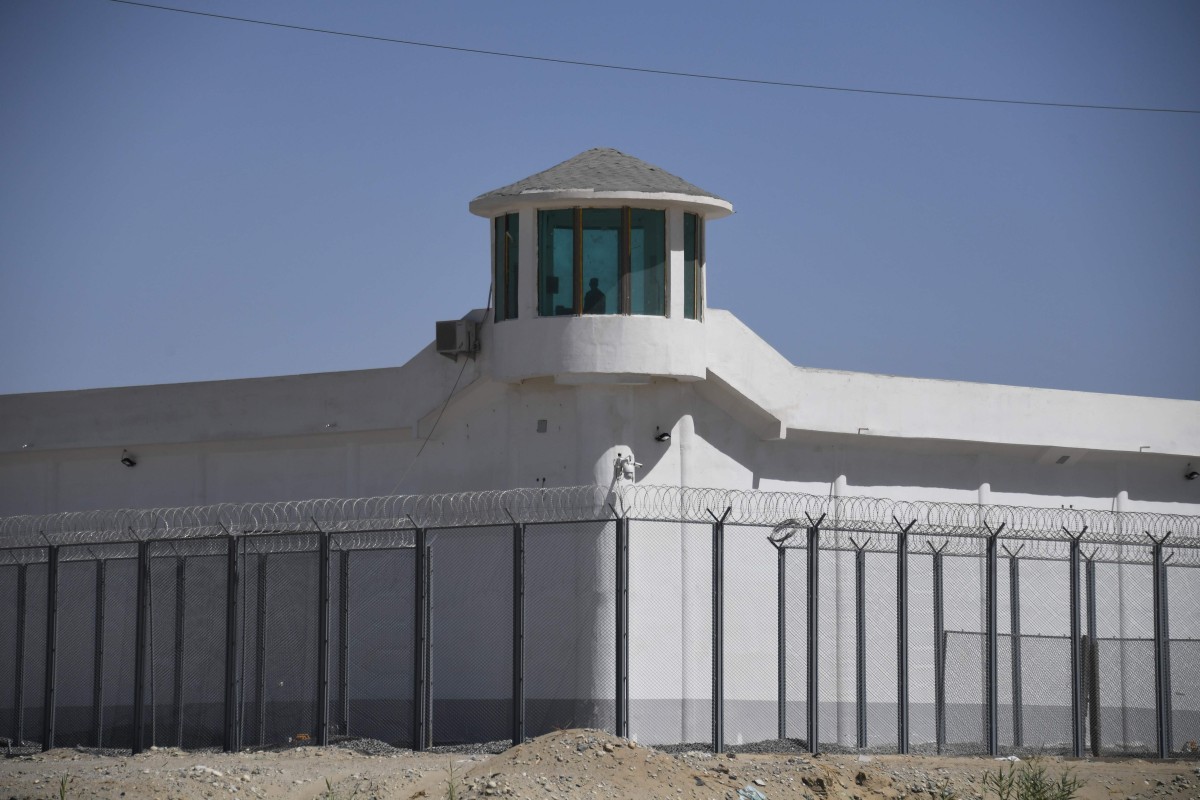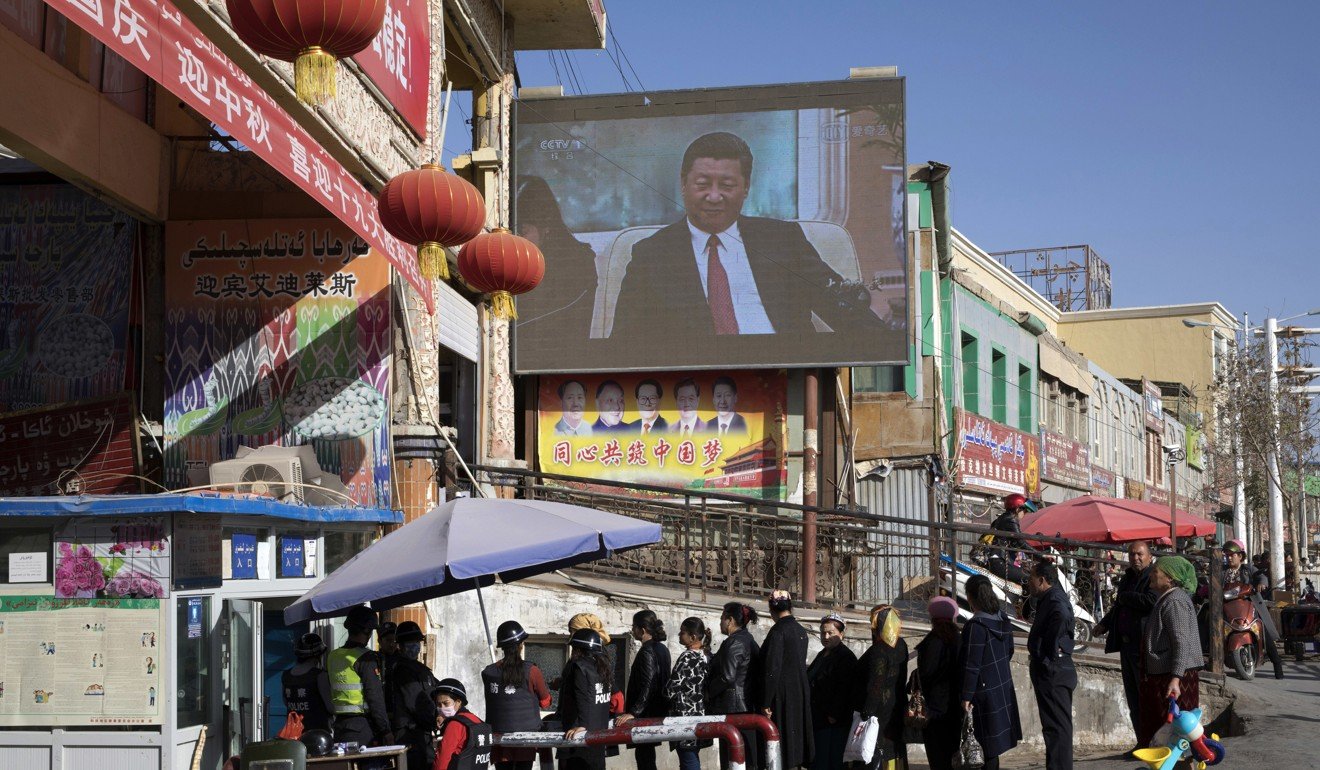- Chinese officials and state media claim ‘interim success’ in troubled region
- Third Work Conference could take place this summer

Published: 12 Jul, 2019

A watchtower at a high-security facility near what is believed to be a re-education camp where mostly Muslim minorities are detained, on the outskirts of Hotan, in Xinjiang. Photo: AFPSigns are emerging that Beijing may be preparing to hold a top policy meeting about the sensitive northwestern region of Xinjiang, where an estimated 1 million Uygur and other mostly Muslim minorities are reported to be held in internment camps.
China’s state-run news agency Xinhua published a review on June 27 of the past five years in a move described as “preparing the ground” for the next Central Xinjiang Work Conference, which sets policy direction for the region.
Describing Xinjiang as “the main battleground in China’s anti-terror war”, Xinhua hailed current policy as “an interim success”, a term which has been common among the region’s Xinjiang officials of late. The Xinhua report said the fight against terrorism and extremism had been effective, with no terror attacks in the region for the past 30 months.
A senior lecturer from the Central Party School, which trains senior party cadres, told the South China Morning Post the term “major interim success”, usually meant the “top leadership believes the policy has achieved its desired goal, and it is time to revisit the issue and fine-tune the policy if necessary”. He requested anonymity due to the sensitivity of the issue.
One source familiar with the situation said “the chance of a third Xinjiang Work Conference this summer is quite high. It has been five years
and the official media are preparing the ground, a pattern we always see.”
The previous conference, in May 2014, was held in Beijing with Chinese president Xi Jinping at the helm.SUBSCRIBE TO US China Trade WarGet updates direct to your inboxBy registering for these newsletters you agree to our T&C and Privacy Policy
The propaganda preparations for the next conference began as early as April, when official newspapers and television stations in Xinjiang began running a series of features commemorating the fifth anniversary of the second Central Xinjiang Work Conference, hailing it as a “great endeavour” and, again, describing “the interim success” of the past five years.
A long feature in regional party mouthpiece Xinjiang Daily recalled Xi’s visit to the region in April 2014, ahead of the previous discussion. The newspaper has also detailed the role in stabilising the area of the Xinjiang Production and Construction Corps (XPCC), the unique paramilitary organisation charged with ensuring social and ethnic stability.

Residents queue at a security checkpoint beneath a screen showing Chinese President Xi Jinping, in Hotan, Xinjiang. Photo: APShare:
Also covered was the help provided by other Chinese provinces in the region’s development, and how deradicalisation measures and anti-terrorism efforts had transformed southern Xinjiang.
Study trips
In addition to the media propaganda campaign, senior officials have been on study visits to Xinjiang in what is seen as an effort to gather information and feedback on the ground to assist decision making by the leadership.The ruling Communist Party’s fourth-ranked leader Wang Yang, who also chairs the Chinese People’s Political Consultative Conference (CPPCC), concluded a six-day information gathering tour in March in which he found Xinjiang had “achieved major interim success”.
Wang has been the party’s top Xinjiang policy coordinator since the CPPCC took charge in 2012 of the Central Committee’s Xinjiang Work Coordination Small Group, which works out the detail and implementation of the policies agreed by the work conference.In a further sign of the importance of Xinjiang to China’s leadership, the secretariat of this small group is lead by Shi Jun, a rising political star and former deputy minister of public security who is now deputy director of the key United Front Work Department (UFWD).
Two months after Wang Yang’s study tour in March, You Quan, director of the Central Committee UFWD and an important senior cadre in Xinjiang policy, also embarked on a study trip to the region.
Xinjiang’s local officials have been equally busy with information gathering trips. Chen Quanguo, Xinjiang’s party chief, began his study tour in the regional capital Urumqi on May 19. In June, he visited another four cities and regions, where he spoke on poverty alleviation, job creation and deradicalisation issues, according to Xinjiang Daily.
Some central government advisers have also been called in to study the situation in Xinjiang. One scholar from the Chinese Academy of Social Science in Beijing told the South China Morning Post he had “just returned from a month-long study trip in Xinjiang, and was writing a paper now”.
He refused to reveal the subject matter of his paper, or where it would be submitted due to sensitivity, saying only that it “related to Xinjiang’s future development”.
Poverty alleviation
Although Beijing has remained tight-lipped on Xinjiang issues, some hints may be found about a new policy direction in Wang Yang’s speech which concluded his Xinjiang trip in March. Wang spoke about strengthening three main areas in the region – deradicalisation to “win people’s hearts”, a poverty alleviation campaign, and a strengthening of the Xinjiang Production and Construction Corps.While the deradicalisation campaign has been high on the agenda for Xinjiang officials, poverty alleviation could be the next main policy focus, in line with the party pledge to do everything it can to eradicate poverty in the world’s most populous nation by 2020.
According to official numbers to the end of 2018, Xinjiang has more than 770,000 residents living below the poverty line, across 22 of some of the poorest counties in the country.
In what may be a further sign of a coming shift in policy focus, Xinjiang party chief Chen visited the poorest parts of the region, including Hotan, before he was called to join the national meeting presided over by Xi in Chongqing in April.
The Central Party School lecturer said Chen’s tour showed Xinjiang was not exempted from China’s national poverty alleviation campaign, even if its main task remains maintaining stability.
“Xinjiang will have to be creative if it is to achieve stability, poverty alleviation and strengthening XPCC policy goals together. I think the state-owned enterprises and the XPCC would be instrumental in the next stage,” the lecturer said.
International China watchers are not expecting a drastic change of course in China’s deradicalisation programme in Xinjiang, despite Wang Yang’s remarks that “we should also guarantee the normal religious needs of believers and respect their customs”.
Fei-Ling Wang, a professor with the Sam Nunn School of International Affairs at the Georgia Institute of Technology, said, “Contrary to many critics and observers outside China, Beijing seems to think its policy is working in Xinjiang, especially for the purpose of wei-wen (maintaining stability), however exorbitant and ugly in appearance. [This will remain] until and unless, another major ‘problem’ erupts.”Fei-Ling Wang said he believed Beijing’s Belt and Road Initiative was intended to “bring some new opportunity of development to Xinjiang and the newly approved Lanzhou-Xining City Group plan may also inject some more juice into Xinjiang’s economy”.
Alfred Wu, an associate professor at Singapore’s Lee Kuan Yew School of Public Policy, said “as development might again be given a higher priority, a bit of loosening up could be happening [in Xinjiang], but it is likely to be for the short term”.
Fei-Ling Wang said “The CCP is unfortunately caught between its two powerful ideological narratives about nationality policy: the traditional tianxia, the great idea of Han domination and assimilation, and the Stalinist practice of preserving multi-nationalities under the party.
“The tension between the two has rendered Beijing’s central control effort very expensive.”
